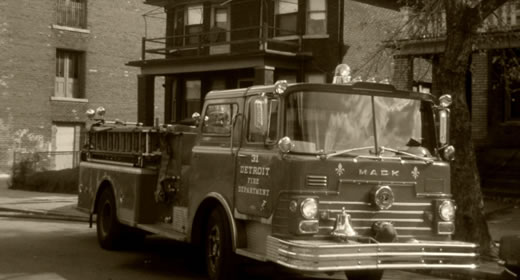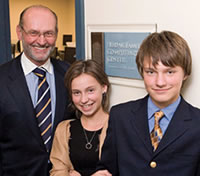
In the summer of 1967, James B. Hudak (MPP '71) watched Detroit burn. He was between his sophomore and junior years as an undergraduate at Yale. A friend got him a summer job working the night shift at a Chrysler assembly plant in Detroit. He lived with a bunch of guys in a rental on Lake St. Clair. At the end of July, at night, he looked across the lake from his home and saw Detroit in flames. He watched giant troop transports filled with Army and National Guard soldiers landing at Selfridge Air Force Base.
"I'd been to college,"he recalls, "but didn't really know what I wanted to do. Living and working in Detroit that summer, I had one of the few epiphanies I've had in my life. I saw the city on fire. I remember thinking 'someone had to do something to help cities.'"
"I went back to Yale in the fall and saw a flier about this brand new public policy degree at Michigan through which you could apply quantitative techniques to solve city and government problems and I thought, 'that's perfect.'" Hudak became a member of the school's inaugural class in the Master of Public Policy (MPP) program.
 |
|
James B. Hudak |
After earning his MPP in 1971, Hudak worked for fellow Ford School graduate Don Borut (MPA '65) in the City of Ann Arbor's administrator's office. Among his duties was serving as the liaison with the "Psychedelic Rangers"—a group of young people recruited to work at citysponsored concerts. The Ann Arbor police had agreed to stay away from the crowds and the concerts so long as drug use, dealing, and other wild behavior were moderated. The Rangers were sort of hall-monitors for the counterculture, charged with keeping the peace within the crowd—thereby keeping the police out. (See p. 14 to read about Borut and the Psychedelic Rangers.)
Within a couple years, Hudak was recruited to work with the City of Palo Alto and from there to the financial office of the City of San Francisco. About his trajectory from liaising with Psychedelic Rangers to working on the budget of one of the country's greatest cities, he credits his public policy education: "It's really versatile," he says, "It's not content specific. I was taught how to analyze problems. I learned techniques and a way of thinking that I have applied to many problems over the years, enabling me to move from police to public works to financial management and more."
The 1967 Detroit Riot started Hudak on a mission to improve cities through local government. Eleven years later, his path curved in relation to another urban tragedy. On November 27, 1978, Hudak was just down the hall when Dan White shot and killed San Francisco Mayor George Moscone and Harvey Milk.
Hudak says the atmosphere for local governments had turned deeply sour. People didn't respect or trust public officials. City officials were assassinated, and city hall was stormed and firebombed. California's Proposition 13 passed, decreasing property taxes and severely restricting the options for local governments.
Hudak left San Francisco and began working with Andersen Consulting, consulting with cities around the globe. He worked with the City of Detroit on a public/private partnership. He worked with Pietermaritzburg, South Africa, as apartheid ended, helping the city progress socially and economically in a turbulent time. He worked with Madrid as the European Union coalesced, helping the city adjust from being the center of a country to a city on the edge of a unified continent. And he worked in Japan and Australia on concepts for a "city of the future"— designed to capitalize on those nations' current and future resources.
In 1990, he was recruited by one of his partners for a different kind of project—health care. At Kaiser Permanente, he recalls, "doctors had been fighting with one another for years about where to do some tests. My partner said 'I've got this guy who worked with the Japanese and Australians for years and who worked with South Africans and apartheid—maybe he can do something with doctors.'" And Hudak did, quite successfully, sending his career in another direction, leading right up to the present and his position as chairman and CEO of Paradigm Management Services.
Paradigm manages care for catastrophically injured patients who are receiving workers' compensation. The company has had tremendous success, with 60 percent of their clients released to return to work compared to the industry average of 13 percent.
As a young man, watching Detroit tear itself apart, Hudak thought that smart, trained, well-intentioned people could make a difference. That he could make a difference. His work has proven him correct and he credits the Ford School with a central role in his success.
"I went to the Ford School thinking that government was the way to make a difference. I learned a broad set of skills with which I could analyze issues and problems, set directions and make good policy. My education made me a broad thinker about a large number of issues, both public and private."
--Story by Bob Brustman
Below is a formatted version of this article from State & Hill, the magazine of the Ford School. View the entire Fall 2013 State & Hill here.